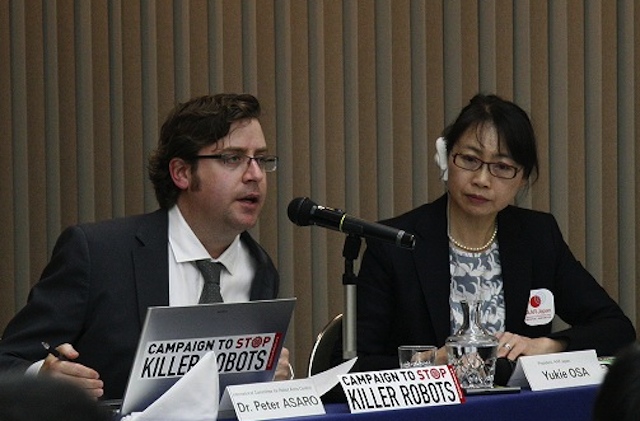
Campaign interest builds in Japan

The Campaign to Stop Killer Robots and its concerns over the prospect of weapons systems that would be able to select and engage targets without meaningful human control features this week in a Newsweek Japan special edition on robotics. The issue comes as US President Barack Obama met with representatives from Japanese robotics companies and their robots during his visit to Japan in April 2014. He reportedly said of the experience, “We saw some truly amazing robots—although I have to say the robots were a little scary.”
A humanoid robot created by the Japanese start-up company Schaft won the US government’s Defense Advanced Research Projects Agency (DARPA) inaugural “Robotics Challenge” by a wide margin in December 2013. Schaft was acquired by Google at the end of 2013 and has subsequently dropped out of the track funded by the Pentagon, but still intends to compete in the final segment of the DARPA contest in late 2014.
Japanese humanitarian aid and disaster relief organization Association for Aid and Relief, Japan is a member of the Campaign to Stop Killer Robots and its leadership steering committee. It worked to sucessfully convince the government of Japan to sign the 1997 treaty banning antipersonnel landmines as a member of the International Campaign to Ban Landmines, 1997 Nobel Peace Prizeco-laureate with Ms. Jody Williams.
Late last year, AAR Japan conducted outreach in Tokyo during a visit by Dr. Peter Asaro, vice-chair of the International Committee for Robot Arms Control (ICRAC), a co-founder of the Campaign to Stop Killer Robots. Asaro was in Japan to attend the IEEE/RSJ International Conference on Intelligent Robots and Systems on 3-8 November 2013.
Dr. Asaro and AAR Japan president Ms. Yukie Osa spoke at an evening forum convened by AAR Japan on 8 November 2013 and attended by more than 60 people. Dr. Asaro and AAR Japan representatives also met with the director of the arms control and disarmament division at Japan’s Ministry of Foreign Affairs, Mr. Yasushi Noguchi, to discuss the campaign’s concerns over fully autonomous weapons and need for action.
The government of Japan made a number of brief statements on fully autonomous weapons late last year when nations were discussing whether to begin work on the topic. In a November 2013 statement, Japan acknowledged that the issue contains “many different elements” relating to human rights, law, technology, and arms control and supported a proposal to begin work on the challenge in 2014.
Japanese robotics experts are scheduled to provide expert presentations at the first Convention on Conventional Weapons (CCW) experts meeting on lethal autonomous weapons systems in Geneva on 13-16 May 2014, including Mr. Hajime Wakuda, director for defense industry, aerospace at Japan’s Ministry of Economy, Trade and Industry, and Dr. Heigo Sato from Takushoku University. AAR Japan’s Ms. Osa and Ms. Natsuki Matsumoto are attending the CCW meeting as part of the Campaign to Stop Killer Robots delegation.
The main public television network NHK and Japanese media outlets including Kyodo News Service have covered the emerging international debate over fully autonomous weapons during the past year.
NHK English story:
Japanese NHK story:
Japanese non-governmental organization Human Rights Now is also a member of the Campaign to Stop Killer Robots.
The next IEEE/RSJ International Conference on Robots and Automation will take place in Hong Kong in June 2014 and includes a workshop on robotics and military applications on 1 Jun, featuring Professor Noel Sharkey, ICRAC chair.
For more information, see:
- AAR Japan website in Japanese and English
- NHK story on Dr. Asaro’s visit and story on the CCW decision, November 2013
- Nobel Women’s Initiative story on the Ottawa outreach events, May 2014
- Newsweek Japan special edition on robotics
Photo: Dr. Peter Asaro (left) and Ms. Yukie Osa (left) at the AAR Japan evening forum on 8 November 2013 (c) AAR Japan


